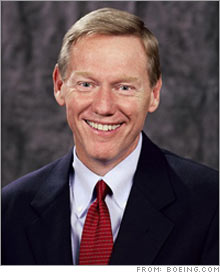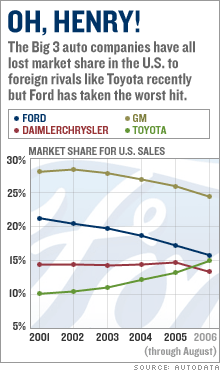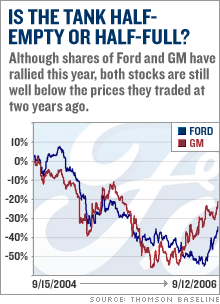|
Ford's troubled 'Way Forward' Stock Spotlight: Will a new CEO and sense of urgency be enough to turn around the deeply troubled No. 2 automaker? NEW YORK (CNNMoney.com) -- Years from now, Ford will probably look back on 2006 just as fondly as it does on its failed Edsel. Over the past nine months, the troubled automaker has lost $1.4 billion and, according to a report in Thursday's Detroit News citing internal documents from the company, executives estimate it could lose nearly $6 billion from its auto operations before taxes and $9 billion overall this year.
What's more, in July the automaker fell behind Toyota (Charts) for the first time ever in U.S. sales. Last week, Bill Ford, great-grandson of company founder Henry Ford, said he would step down as CEO, to be replaced by outsider and former Boeing exec Alan Mulally. Ford updated its "Way Forward" turnaround plan Friday, saying it would cut 14,000 salaried workers and suspend its dividend in the fourth quarter. It also moved up its scheduled plant closing by the end of 2008 and added two additional plants, as part of a larger effort to save $5 billion in costs. Board members met Wednesday and Thursday of this week to reevaluate the company's restructuring plan announced earlier this year which included closing 14 plants and slashing 30,000 hourly jobs by 2012. Yet Ford (up $0.05 to $8.24, Charts) shares, while they have lagged behind crosstown rival GM, have performed surprisingly well despite all the setbacks, climbing 14 percent this year. GM (up $0.25 to $31.78, Charts) shares have soared 43 percent. But with the automaker expected to keep losing market share, and money, this year and next, the consensus on Wall Street is that, despite the recent rally, the stock of the 103-year-old company is going nowhere fast. Still, Ford surprised many naysayers in the late 1990s by bumping up its stock above $30 a share after it disposed of assets including its auto parts division and a credit unit. A difficult road so far When Ford announced its second restructuring initiative since 2001 in January, the company was hoping its "Way Forward" plan could stem years of market share declines in the U.S. But the company's problems have only gotten worse since then. Ford took additional steps, including shrinking its U.S. dealer network and shuttering 10 North American plants to cut costs related to sluggish sales of its F-series pickup trucks, which nevertheless remain the nation's best-selling vehicle. It has even been considering shedding its iconic Aston Martin brand. Friday's announcement comes as Wall Street had pressuring Ford to speed up its cost cuts in the face of worse than expected losses and weak sales. "They need to cut costs out now, not 3, 4, 5, 6 years from now," said Kevin Tynan, auto analyst for Argus Research, who has a "sell" rating on the stock, speaking prior to Ford's announcement on Friday. "They need it in the next 12 to 24 months." Some believed another, more startling announcement by the automaker was not out of the realm of possibilities for the automaker. In recent weeks, speculation has swirled that Ford might consider going private or selling a stake of its profitable auto financing unit. "I think everything is on the table," David Cole, chairman for the Center for Automotive Research, said ahead of Friday's announcement. "They know doing nothing is not an option." Mulally to the rescue Last week, Ford took one of its biggest steps in the restructuring process by tapping Mulally, who has never worked in the auto industry but who helped lead a turnaround at Boeing, as head of the company's commercial airplane business. Mulally, 61, has been no stranger to adversity. He led Boeing (Charts) through the difficult years the aircraft industry faced following the Sept. 11 attacks, a four-week strike by production workers in 2005 and heated competition from European rival Airbus. Since 2001, Bill Ford has manned the helm of the company his great-grandfather founded, which rose to worldwide fame by introducing the Model T and the moving assembly line. That changed last week when Ford stepped down as CEO, and defended his surprising decision to hire his replacement from outside the organization. "I was more focused on who was the best candidate," Ford told reporters following the announcement. "Business skills are by and large transferable, especially with someone with an industrial background who's focused on the customer." Jon Rogers, a senior auto analyst at Citigroup, said he believes Mulally might be able to turn Ford around. "He's got turnaround experience and has a reputation as a very good manager," said Rogers. "I think anyone who takes the job at Ford has a lot of wood to chop but he seems like he has a decent track record and organization skills." While Mulally will have to prove he can just as easily run an automobile company and show he can play nice with the United Auto Workers, one particular challenge will be breathing new life into Ford's product line, which some analysts say is the company's biggest weakness. Analysts say the company's product is outdated compared to its competitors and that there are very few new models slated for release. One vehicle that might hit showrooms soon is a yet-to-be-named vehicle based on the Ford Fairlane concept car that will replace its minivan, according to a report this week by the Detroit News. "He needs to start developing products that people want to buy to a greater extent than they do now," said Brett Hoselton, senior auto analyst at KeyBanc Capital Markets. Any zip in Ford stock? While Ford executives see the urgency of the company's woes and know they need to end its slide in market share, Wall Street isn't necessarily convinced the stock is worth buying. Most analysts rate it a 'sell' or 'underperform.' The company is expected to lose 51 cents a share this year, according to consensus estimates from Thomson First Call. And, on average, analysts expect a loss of 23 cents a share in 2007. Even though Ford accelerated its turnaround plan significantly, there may not be much more upside for the stock. Ford is trying to get back on the road to profitability, but there's probably too much uncertainty in the near term for investors to test-drive Ford shares, especially since the stock has already enjoyed a nice run this year. None of the analysts quoted in this story own shares of Ford. Citigroup has an investment banking relationship with the company. ______________________ |
|



